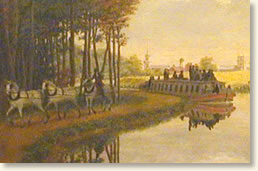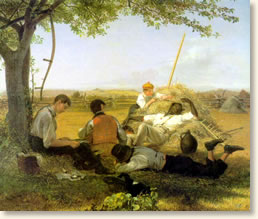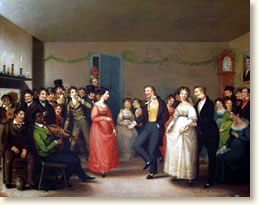|
A Portrait of America ca. 1830
In 1830 America boasted a population of approximately
13,000,000 people distributed among 25 states. Andrew Jackson, the "Great Commoner",
was President. It was a land filled with unbridled pride and a confident optimism
that the future would be better than the present. The revolution that created
the country had ended only forty-seven years before. America had emerged
 |
Travelling the Erie Canal, ca. 1830
|
victorious from the War of 1812 - the country's "Second War of Independence" -only
fifteen years earlier. The Erie Canal - the pathway that would open up the West
- had been completed five years earlier. America's first locomotive, the "Tom
Thumb",
made its first run that very year. America was growing, there was plenty of land
available to start a new life and certainly the future would be better than the
past.
Thomas Low Nichols captures this climate of optimism in a survey of life in New
England in the 1830s. Born in New Hampshire in 1815, Nichols grew up to be
a journalist and prolific writer. His writings promoted health foods, free
love, spiritualism and other new ideas. At the outbreak of the Civil War, Nichols
and his wife left America to live in England as a protest. While
there, he published a number of works including a memoir of his youth in New
England that provides us insight into life in America in the early nineteenth
century:
We join Thomas Nichol's story as he recalls his
youth in New Hampshire in the 1830s:
We traversed our rough New England roads with mail-coaches, drawn by four or six horses, at the rate of six or eight miles an hour. . .
The roads, never very good, were very bad in the spring, when the melting snows and the up-heaving of the frost made mud a foot or more in depth. In swampy places logs and poles were laid across, to form a roadway called corduroy, over which vehicles bumped and jolted at the slowest pace. . .There were a few turnpike roads, made and kept in repair by companies, who gathered tolls for their use; but these were never properly made.
. . .My father had been drafted as a militia-man during the war of 1812, and might have fought in the famous battle of Plattsburg had not his business engagements made it necessary for him to hire a substitute, by which he lost not only much glory, but the bounty-money and a hundred and sixty acres of land, which was afterwards given to every surviving soldier whose name could be found upon the rolls of the army. But, though compelled by circumstances to forego the honours and profits of serving his country during the war, he was full of martial spirit, and rose in the militia from the ranks to be corporal, sergeant, ensign, lieutenant, captain, major, and finally the colonel of a regiment. We had drills, trainings, officers' drills, and once a year that glorious military spectacle of the muster of a whole regiment, and every few years the general muster of an entire brigade. . .
Even the company trainings on the green before the meeting house were great days. The spectators gathered in crowds, drank sweet cider and New England rum, and ate molasses-gingerbread. Emulous pedlars sold tin-ware, and Yankee notions at auction with stentorian lungs.
No American can be made to understand why he should not be eligible for presentation to queen or emperor. He is the political equal to the President, and, probably enough, his social superior. If he belongs to the highest rank of his own country, why should he not associate on equal terms with the highest rank of any other? Every American who visits Washington calls to see the President, shakes hands with him, and asks him how he does, and how his family is; and sees no reason why he should not do the same by the Queen of England or the Russian Czar. As Halleck, the Connecticut poet, says of his fellow Yankees, they
"WouId shake hands with a king upon his throne,
And think it kindness to his majesty."
|
The military spirit and the spirit of patriotism, in my early days were universal. We had no doubt that ours was the freest, most enlightened, and happiest country, in the world; and, in spite of the envy of tyrants, we felt sure that all the rest of mankind would soon be of the same opinion, and only too glad to follow our example. We entertained these sentiments at all times, but devoted one day in the year in an especial manner to their expression. This was the Fourth of July.
The founders of the New England Republics held that the safety of Democratic institutions depended upon the intelligence and virtue of the people. . .
 |
| William Sidney Mount |
"Farmers Nooning"
taking a midday break, 1839
|
In my native State, and in all the New England States, there was a school-house every three miles, an academy in every considerable village, and colleges enough to supply the demand for classical education. We went first of all to the common, or free school. There were very few private, or pay schools; and boarding schools, except in the largest towns, were unknown.
As none were very rich, and none had any need to be very poor; as all were equal in theory, and not very far from it in practice, we all went to the same schools, and were taught by the same schoolmasters in winter and the same "schoolma'ams" in summer. At the age of four years I trudged off a mile and a quarter to the district school-house, at the foot of a sandy hill, near the bank of the beautiful river, with fields to play in shaded by spreading pine-trees, with winter-green, strawberries, raspberries, blackberries, wild cherries, and grapes in their season, all free to us.
We had no professional teachers in those days for our common schools. Some bright, well-taught girl, who loved books better than spinning, taught our school in summer. In winter we generally had a student from the nearest college, who paid his fees and expenses by keeping school three months in the year, and graduated none the worse for his pedagogic experience.
. . .In New Hampshire the people taxed themselves generously, and to make the money raised in or coming to the district go as far as possible, the teacher was either put up at auction and boarded with the lowest bidder, or boarded round.
Every year, at town-meeting, the paupers of the town were sold at auction to those who would keep them cheapest, taking into account the work they were capable of doing. The pauper was a slave, sold for a year at a time, but sold yearly as long as he lived. The schoolmaster was treated in the same inglorious fashion. The cheaper he could be boarded, the longer the money would last, and the longer the school-term continue. . .and though the teacher might have long walks when boarding at the extremities of the district, he was treated everywhere with the attentions due to a transient and honored guest. The best room in the house and the best fare that could be provided were ready for the schoolmaster.
 |
| William Sidney Mount |
A Dance after a Sleigh Ride, 1830
|
The one perpetual incentive to hard study in our schools was ambition. Every boy knew that he might be the governor of the State, or a member of Congress. There was nothing to hinder him from being President; all he had to do was to learn. No position was beyond his reach if he chose to work for it. Franklin was a printer's boy and Andrew Jackson a poor boy who worked his way up from the humblest position. What was Patrick Henry, whose eloquence thrilled us as we spouted his famous speech in the Virginia Assembly? A country tavern-keeper. Our history was full of men who had risen from the ranks, and what in other countries would be called the lowest ranks, of life. We knew that where there was a will there was a way, and our teachers constantly stimulated us by the glittering prizes of wealth, honors, offices, and distinctions which were certainly within our reach.
This constant stimulation of hope, emulation, and ambition, often produced its natural result of feverish effort and discontent. Few were content to live at home and cultivate the niggard soil of New Hampshire. If we wished to be farmers, there were the fertile bottom lands and broad prairies of the West. But we could be doctors, lawyers, preachers, merchants; there were a hundred avenues to wealth and fame opening fair before us, if we only chose to learn our lessons. Of course we learnt them.
References:
This eyewitness account appears in: Nichols, Thomas, Low,
Forty Years of American Life (1864).
How To Cite This Article:
"A Portrait of America, 1830", EyeWitness to History, www.eyewitnesstohistory.com
(2008).
|






